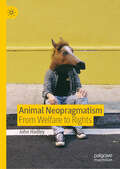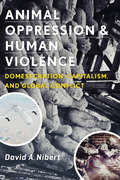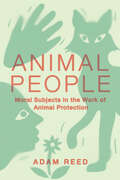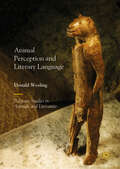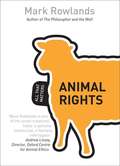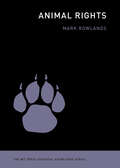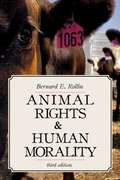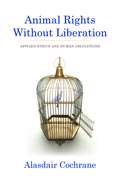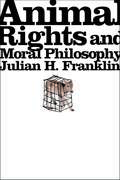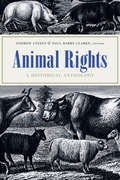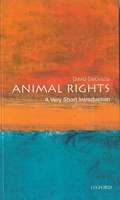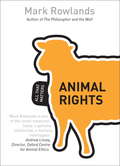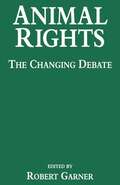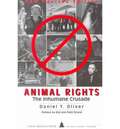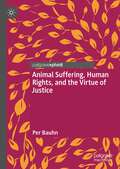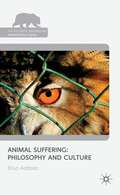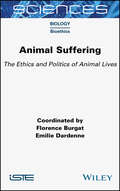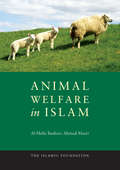- Table View
- List View
Animal Neopragmatism: From Welfare to Rights
by John HadleyThis book affords a neopragmatic theory of animal ethics, taking its lead from American Pragmatism to place language at the centre of philosophical analysis. Following a method traceable to Dewey, Wittgenstein and Rorty, Hadley argues that many enduring puzzles about human interactions with animals can be ‘dissolved’ by understanding why people use terms like dignity, respect, naturalness, and inherent value. Hadley shifts the debate about animal welfare and rights from its current focus upon contentious claims about value and animal mindedness, to the vocabulary people use to express their concern for the suffering and lives of animals. With its emphasis on public concern for animals, animal neopragmatism is a uniquely progressive and democratic theory of animal ethics.
Animal Oppression and Human Violence: Domesecration, Capitalism, and Global Conflict (Critical Perspectives on Animals: Theory, Culture, Science, and Law)
by David NibertJared Diamond and other leading scholars have argued that the domestication of animals for food, labor, and tools of war has advanced the development of human society. But by comparing practices of animal exploitation for food and resources in different societies over time, David A. Nibert reaches a strikingly different conclusion. He finds in the domestication of animals, which he renames "domesecration," a perversion of human ethics, the development of large-scale acts of violence, disastrous patterns of destruction, and growth-curbing epidemics of infectious disease. <P><P>Nibert centers his study on nomadic pastoralism and the development of commercial ranching, a practice that has been largely controlled by elite groups and expanded with the rise of capitalism. Beginning with the pastoral societies of the Eurasian steppe and continuing through to the exportation of Western, meat-centered eating habits throughout today's world, Nibert connects the domesecration of animals to violence, invasion, extermination, displacement, enslavement, repression, pandemic chronic disease, and hunger. In his view, conquest and subjugation were the results of the need to appropriate land and water to maintain large groups of animals, and the gross amassing of military power has its roots in the economic benefits of the exploitation, exchange, and sale of animals. Deadly zoonotic diseases, Nibert shows, have accompanied violent developments throughout history, laying waste to whole cities, societies, and civilizations. His most powerful insight situates the domesecration of animals as a precondition for the oppression of human populations, particularly indigenous peoples, an injustice impossible to rectify while the material interests of the elite are inextricably linked to the exploitation of animals. Nibert links domesecration to some of the most critical issues facing the world today, including the depletion of fresh water, topsoil, and oil reserves; global warming; and world hunger, and he reviews the U.S. government's military response to the inevitable crises of an overheated, hungry, resource-depleted world. Most animal-advocacy campaigns reinforce current oppressive practices, Nibert argues. Instead, he suggests reforms that challenge the legitimacy of both domesecration and capitalism.
Animal Passions and Beastly Virtues: Reflections on Redecorating Nature
by Jane Marc Bekoff GoodallWho hasn't wondered what it's like to be a dog or bird? Such questions seem unanswerable because we have no way of getting into an animal's mind. Marc Bekoff's work on animal behavior and mind draws world-wide attention for its originality and its probing into what animals might know as well as what skills (mental and physical) are needed to live life successfully as a member of a particular species. Convinced that individuals of every species have some level of self-awareness, Bekoff embarks on fascinating (and often amusing) observations of animals playing, leaving and detecting scent-marks, solving problems, and behaving fairly toward each other. Animal Passions and Beastly Virtues brings together some of his path-breaking research papers, essays on science and ethics, and popular articles in order to reveal a remarkable range of animal behaviors but also to argue that the ethical treatment of animals is an especially significant issue now.
Animal People: Moral Subjects in the Work of Animal Protection (Expertise: Cultures and Technologies of Knowledge)
by Adam ReedAnimal People introduces readers to the professionalized world of animal protection from the perspective of those who consider themselves to be "moderate" activists. Adam Reed explores the interrelationships between moral cause and organizational culture, including the ways in which expert roles such as investigator and lobbyist inform the practice and outlook of animal protection. This book examines not only connections between forms of professionalism and everyday advocacy but also how those working to improve the welfare of animals can come to possess an expertise in public or mainstream ethics.Reed explores these issues through the example of a Scottish-based animal protection organization. Animal People makes a distinctive contribution to anthropological debate and discussion relating to human and nonhuman animal interactions, activism, and the attributions and imperatives of moral action.
Animal Perception and Literary Language (Palgrave Studies in Animals and Literature)
by Donald WeslingAnimal Perception and Literary Language shows that the perceptual content of reading and writing derives from our embodied minds. Donald Wesling considers how humans, evolved from animals, have learned to code perception of movement into sentences and scenes. The book first specifies terms and questions in animal philosophy and surveys recent work on perception, then describes attributes of multispecies thinking and defines a tradition of writers in this lineage. Finally, the text concludes with literature coming into full focus in twelve case studies of varied readings. Overall, Wesling's book offers not a new method of literary criticism, but a reveal of what we all do with perceptual content when we read.
Animal Revolution
by Ron BroglioWhy our failure to consider the power of animals is to our deep detriment Animals are staging a revolution—they&’re just not telling us. From radioactive boar invading towns to jellyfish disarming battleships, this book threads together news accounts and more in a powerful and timely work of creative, speculative nonfiction that imagines a revolution stirring and asks how humans can be a part of it. If the coronavirus pandemic has taught us anything, it is that we should pay attention to how we bump up against animal worlds and how animals will push back. Animal Revolution is a passionate, provocative, cogent call for us to do so.Ron Broglio reveals how fur and claw and feather and fin are jamming the gears of our social machine. We can try to frame such disruptions as environmental intervention or through the lens of philosophy or biopolitics, but regardless the animals persist beyond our comprehension in reminding us that we too are part of an animal world. Animals see our technologies and machines as invasive beings and, in a nonlinguistic but nonetheless intensive mode of communicating with us, resist our attempts to control them and diminish their habitats. In doing so, they expose the environmental injustices and vulnerabilities in our systems. A witty, informative, and captivating work—at the juncture of posthumanism, animal studies, phenomenology, and environmental studies—Broglio reminds us of our inadequacy as humans, not our exceptionalism.
Animal Rights
by Mark RowlandsAnimal Rights is a big deal. From animal testing to vegetarianism, and hunting to preservation of fish stocks, it's a topic that's always in the news. Mark Rowlands, author of The Philosopher and the Wolf, is the world's best known philosopher of animal rights. In this, the first introduction he has written to the topic, he starts by asking whether there is anything about humans that makes us psychologically or physiologically distinctive - so that there might be a moral justification for treating animals in a different way to how we treat humans. From this foundation, he goes on to explore specific issues of eating animals, experimentation, pets, hunting, zoos, predation and engineering animals. He ends with a challenging argument of how an improved understanding of animal ethics can and should affect readers' choices.
Animal Rights (The MIT Press Essential Knowledge series)
by Mark RowlandsA fresh view of animals and what we owe them.Do animals have moral standing? Do they count, morally speaking? In Animal Rights, Mark Rowlands argues that they do and explores the implications of this idea. He identifies three different waves in animal rights writing. The first wave was defined by a traditional dispute between utilitarianism (represented by Peter Singer) and rights-based approaches (represented by Tom Regan) to ethics. The second wave was defined by an expansion in a conception of ethics, which saw utilitarian and rights-based approaches supplemented by other ethical traditions, including contractualism, virtue ethics, and care ethics. The third wave was defined by an expansion in our conception of animals, driven by exciting new developments in the field of comparative psychology.Each of these waves had ramifications for how we understand the moral status of animals, but, this book argues, and reinforces, the core idea that animals deserve moral respect. In earlier waves, discussions of animal ethics had been focused on the issue of animal suffering. But the third wave is defined by the idea that animals are far more than merely sufferers or enjoyers of experiences but are instead authors of their own lives: creatures capable of choosing how to live, shaped by a conception of their life and how they would like it to go. Rowlands writes that, no matter what moral theory you choose, the most plausible version of that theory entails that animals have moral standing and that our obligations to them are far more substantial than many of us care to acknowledge.
Animal Rights And Human Morality (Third Edition)
by Bernard E. RollinIt's been more than two decades since the first edition of this landmark book garnered public accolades for its sensitive yet honest and forthright approach to the many disquieting questions surrounding the emotional debate over animal rights. Is moral concern something owed by human beings only to human beings? <p><p> Drawing upon his philosophical expertise, his extensive experience of working with animal issues all over the world, and his knowledge of biological science, Bernard E. Rollin -- now widely recognized as the father of veterinary ethics -- develops a compelling analysis of animal rights as it is emerging in society. The result is a sound basis for rational discussion and social policy development in this area of rapidly growing concern. He believes that society must elevate the moral status of animals and protect their rights as determined by their natures. His public speaking and published works have contributed to passage of major federal legislation designed to increase the well-being of laboratory animals. <p> This new third edition is greatly expanded and includes a new chapter on animal agriculture, plus additional discussions of animal law, companion animal issues, genetic engineering, animal pain, animal research, and many other topics.
Animal Rights Without Liberation: Applied Ethics and Human Obligations
by Alasdair CochraneThrough its emphasis on meeting learning objectives, the Task-Centered Model for Educational Supervision (TCS) accommodates new models of field instruction in social work, teaching accountability in fieldwork supervision and instructing novice social workers in how to be self-initiating and evaluative. The application of the TCS model in various real-life education and practice environments is illustrated by detailed case vignettes throughout the book.
Animal Rights Without Liberation: Applied Ethics and Human Obligations (Critical Perspectives on Animals: Theory, Culture, Science, and Law)
by Alasdair CochraneAlasdair Cochrane introduces an entirely new theory of animal rights grounded in their interests as sentient beings. He then applies this theory to different and underexplored policy areas, such as genetic engineering, pet-keeping, indigenous hunting, and religious slaughter. In contrast to other proponents of animal rights, Cochrane claims that because most sentient animals are not autonomous agents, they have no intrinsic interest in liberty. As such, he argues that our obligations to animals lie in ending practices that cause their suffering and death and do not require the liberation of animals. Cochrane's "interest-based rights approach" weighs the interests of animals to determine which is sufficient to impose strict duties on humans. In so doing, Cochrane acknowledges that sentient animals have a clear and discernable right not to be made to suffer and not to be killed, but he argues that they do not have a prima facie right to liberty. Because most animals possess no interest in leading freely chosen lives, humans have no moral obligation to liberate them. Moving beyond theory to the practical aspects of applied ethics, this pragmatic volume provides much-needed perspective on the realities and responsibilities of the human-animal relationship.
Animal Rights and Moral Philosophy
by Julian H. FranklinAnimals obviously cannot have a right of free speech or a right to vote because they lack the relevant capacities. But their right to life and to be free of exploitation is no less fundamental than the corresponding right of humans, writes Julian H. Franklin. This theoretically rigorous book will reassure the committed, help the uncertain to decide, and arm the polemicist.Franklin examines all the major arguments for animal rights proposed to date and extends the philosophy in new directions. <P><P>Animal Rights and Moral Philosophy begins by considering the utilitarian argument of equal respect for animals advocated by Peter Singer and, even more favorably, the rights approach that has been advanced by Tom Regan. Despite their merits, both are found wanting as theoretical foundations for animal rights. Franklin also examines the ecofeminist argument for an ethics of care and several rationalist arguments before concluding that Kant's categorical imperative can be expanded to form a basis for an ethical system that includes all sentient beings. Franklin also discusses compassion as applied to animals, encompassing Albert Schweitzer's ethics of reverence for life. He concludes his analysis by considering conflicts of rights between animals and humans.
Animal Rights: A Historical Anthology
by Linzey Andrew Paul Barry Clarke Eds.This comprehensive and diverse anthology, the only one of its kind, illuminates the complex evolution of moral thought regarding animals and includes writings from ancient Greece to the present. Animal Rights reveals the ways in which a variety of thinkers have addressed such issues as our ethical responsibilities for the welfare of animals, whether animals have rights, and what it means to be human.
Animal Rights: A Historical Anthology
by Linzey Andrew Paul Barry ClarkeIluminates the complex evolution of moral thought regarding animals
Animal Rights: A Reference Handbook
by Clifford J. SherryReviews the issues surrounding animal rights, including experimentation and animal harvesting. Presents the history of the issue, significant federal legislation, and arguments of activists on both sides of the debate. Includes biographical sketches and extensive annotated listings of organizations and print and nonprint resources.
Animal Rights: A Very Short Introduction
by David DegraziaThis volume provides a general overview of the basic ethical and philosophical issues of animal rights. It asks questions such as: Do animals have moral rights? If so, what does this mean? What sorts of mental lives do animals have, and how should we understand welfare? By presenting models for understanding animals' moral status and rights, and examining their mental lives and welfare, David DeGrazia explores the implications for how we should treat animals in connection with our diet, zoos, and research. Animal Rights distinguishes itself by combining intellectual rigor with accessibility, offering a distinct moral voice with a non-polemical tone.
Animal Rights: All That Matters
by Mark RowlandsAnimal Rights is a big deal. From animal testing to vegetarianism, and hunting to preservation of fish stocks, it's a topic that's always in the news. Mark Rowlands, author of The Philosopher and the Wolf, is the world's best known philosopher of animal rights. In this, the first introduction he has written to the topic, he starts by asking whether there is anything about humans that makes us psychologically or physiologically distinctive - so that there might be a moral justification for treating animals in a different way to how we treat humans. From this foundation, he goes on to explore specific issues of eating animals, experimentation, pets, hunting, zoos, predation and engineering animals. He ends with a challenging argument of how an improved understanding of animal ethics can and should affect readers' choices.
Animal Rights: All That Matters (All That Matters)
by Mark RowlandsAnimal Rights is a big deal. From animal testing to vegetarianism, and hunting to preservation of fish stocks, it's a topic that's always in the news. Mark Rowlands, author of The Philosopher and the Wolf, is the world's best known philosopher of animal rights. In this, the first introduction he has written to the topic, he starts by asking whether there is anything about humans that makes us psychologically or physiologically distinctive - so that there might be a moral justification for treating animals in a different way to how we treat humans. From this foundation, he goes on to explore specific issues of eating animals, experimentation, pets, hunting, zoos, predation and engineering animals. He ends with a challenging argument of how an improved understanding of animal ethics can and should affect readers' choices.
Animal Rights: Opposing Viewpoints
by Andrew HarnackEssays giving opposing viewpoints on a variety of topics related to animal rights. Areas include whether animals do in fact have rights, whether animal experimentation is justified, the use of animals for food and other commodities, the protection of wildlife, and unresolved issues within the animal rights movement.
Animal Rights: The Changing Debate
by Robert GarnerDo animals have rights and, if so, what exactly are they? Further, how do these rights relate to human rights? These questions have long bedeviled scientists, philosophers, and animal advocates and today remain as contested as ever. <p><p>Combining the writings of leading academics and activists such as Peter Singer and Michael W. Fox, this anthology examines the development of animal rights discourse over the past quarter century to anticipate the future of the debate. Touching on every aspect of human-animal relations, from agriculture and animal experimentation to the animal rights movement in the United States and abroad, the contributors both question and affirm the utility of the concept of rights. <p><p>Informing this volume is the belief that, regardless of where one stands on the issues of animal rights, it is simply indisputable that how we perceive and treat animals is fundamentally and inextricably related to how we define ourselves.
Animal Rights: the Inhumane Crusade
by Daniel T. OliverA thorough-going discussion and analysis of the animal rights movement, including history, philosophy and tactics. Contains dosiers of prominant figures as well as organizations. Chapter footnotes and bibliography are also included.
Animal Suffering, Human Rights, and the Virtue of Justice
by Per BauhnIn this book, Per Bauhn does three things. First, he outlines some aspects of contemporary philosophical views on animals and morality, including the criticism of speciesism and the animal rights argument. Second, he criticizes these views, arguing that we cannot escape a speciesist perspective on morality, and that there are no good reasons why we should believe that non-human animals have moral rights. Third, he argues that cruelty against non-human animals is morally wrong, but not because animal rights are being violated but because human agents who inflict cruelty on non-human animals are failing their duty to develop in themselves the virtue of justice. This latter argument is reminiscent of Immanuel Kant’s idea that we have only indirect duties towards animals, but unlike that idea, Bauhn's argument does not depend on any causal hypothesis that humans who are cruel to animals are likely to be cruel also to their fellow humans. Instead, Bauhn's argument relies on the fact that being cruel to non-human animals and other innocent beings is conceptually and logically inconsistent with the virtue of justice – a virtue which agents are rationally required to develop in themselves.
Animal Suffering: Philosophy and Culture
by Elisa AaltolaExploring how animal suffering is made meaningful within Western ramifications, the book investigates themes such as skepticism concerning non-human experience, cultural roots of compassion, and contemporary approaches to animal ethics. At its center is the pivotal question: What is the moral significance of animal suffering?
Animal Suffering: The Ethics and Politics of Animal Lives
by Florence Burgat Emilie DardenneThis interdisciplinary volume deals with the most painful situations encountered by animals in the wild or under human guardianship. It seeks to illustrate some remarkable cases and present a general picture of the commodification of animals. This volume starts with an exploration of the capture of animals intended for European zoological parks, the treatment of animals in South Korea, pig farming in China and animal testing in Europe. It goes on to explore animal politics, with a focus on Europe. The moral problems posed by the different types of harm caused to animals are then approached from the vantage point of moral philosophy. Finally, the points of view of veterinary sciences and applied ethics related to animal emotions, suffering and death complete the picture.
Animal Welfare in Islam
by Al-Hafiz Basheer Ahmad MasriThis pioneering modern classic examines the Islamic principles of kindness and compassion toward animals. It compares animal sacrifice as practiced by the world's major religions and highlights the ethical issues that the mass production of meat raises, advocating alternative ways to produce halal meat in an appropriate manner. Basheer Ahmad Masri (1914-1992) was the first Sunni Imam of the oldest purpose-built mosque in Britain, the Shahjahan Mosque in Woking. For six years he served as a joint editor of the monthly Islamic Review. He was fluent in English, classical Arabic, Urdu, Hindustani, Punjabi, and Kiswahili.
